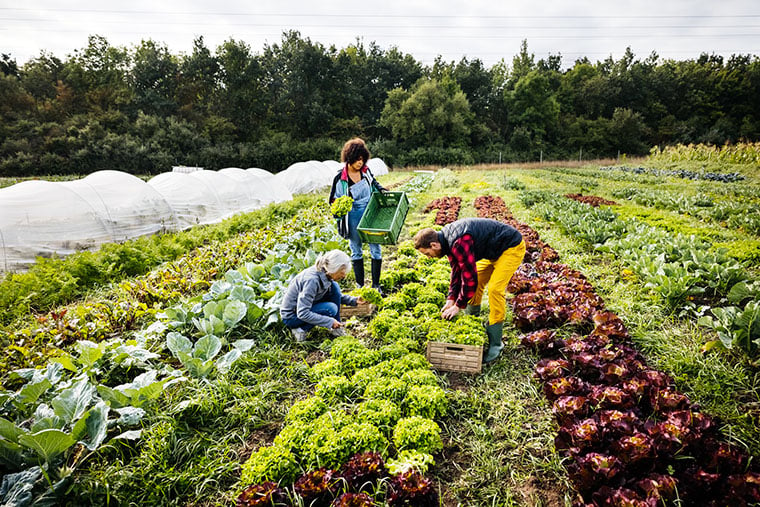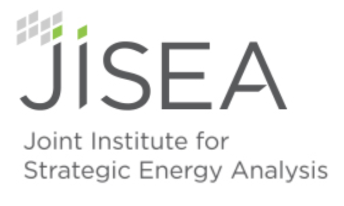Sustainable Agriculture Catalyzer
The Sustainable Agriculture Catalyzer is investigating the potential opportunities, research gaps, and barriers to implementation related to cobenefits of various agricultural decarbonization strategies.
Agricultural decarbonization strategies present an opportunity to bring a wide range of benefits beyond emissions reductions to stakeholders in the agricultural supply chain. However, various factors, including costs, accessibility of technologies, and timescale of implementation can lead to trade-offs associated with these strategies. There are potential benefits and trade-offs in a variety of areas:

Benefits
- Fairer distribution of energy service benefits
- Increased energy security
- Meeting renewable energy goals
- Decreased environmental injustices to neighboring communities
Trade-offs
- Potential for uneven distribution of benefits
Benefits
- Disaster resiliency
- Decreased risk through diversification of production
- Increased yields
- Improved intergenerational sustainability of farmland
Trade-offs
- Decreased yields
Benefits
- Erosion control
- Decreased land degradation
- Improved biodiversity
- Decreased air and water pollution
- Increased water conservation and quality
- Increased wildlife habitat
- Carbon sequestration and/or lowered greenhouse gas emissions
- Decreased land use conversion to cropland
Trade-offs - Increased land use
- Increased water use
Benefits
- Increased profit potential
- Better pest and/or weed control
- Improved soil health
- Increased yields
- Financial incentives
- Lower veterinary costs
Trade-offs
- Decreased profits
- Farmer learning curves
- Increased time requirements
- Delayed benefits
- High cost of investment and/or inputs
- Unproven technologies
- Decreased yields
Benefits
- More nutritious food
- Improved farmer health
- Improved livestock health
- Reduced on-site air pollution and emissions
- Disease/pathogen control
Benefits
- Increased job opportunities in:
- Agricultural technology (robotics, drones, etc.)
- Renewable energy operations and management (wind, solar, biogas)
Benefits
- More shared information and sense of community among farmers
- Educational opportunities for K-12, college, and university students
Benefits
- Preserving heirloom seeds and cultural cultivars
- Highlighting indigenous farming techniques
The Sustainable Agriculture Catalyzer is building off the insights from its foundational report, Pathways for Agricultural Decarbonization in the United States, which identifies and quantifies agricultural decarbonization cobenefits and tradeoffs, as well as the barriers to the implementation of mitigation strategies. The catalyzer will further evaluate these benefits and tradeoffs in a way that prioritizes real-world insights from a diverse network of stakeholders. Through workshops and knowledge-building partnerships, the catalyzer is bringing together farmers, manufacturers, educational institutions and other players in the agricultural supply chain to share their perspectives and contribute to the development of a holistic understanding of the impact of these strategies. By collaboratively identifying and investigating cobenefits, the catalyzer will provide analyses to guide the implementation of decarbonization strategies and promote sustainable agricultural practices that benefit the farmers, community, and environment.
Publications and Related Work
Pathways for Agricultural Decarbonization in the United States, NREL Technical Report (2023)
Quantifying Agricultural Productive Use of Energy Load in Sub-Saharan Africa and its Impact on Microgrid Configurations and Costs, Applied Energy (2023)
Geographically Dependent Sustainability Indicators for Comparison of Conventional Vegetable Production to Controlled-Environment Agriculture, NREL Presentation (2023)
The 5 Cs of Agrivoltaic Success Factors in the United States: Lessons From the InSPIRE Research Study, NREL Technical Report (2022)
Agrivoltaics Provide Mutual Benefits Across the Food–Energy–Water Nexus in Drylands, Nature Sustainability (2019)
Partnerships Opportunities
If your organization is interested in the analysis of agricultural decarbonization cobenefits or other aspects of agricultural decarbonization research, we encourage you to reach out to the JISEA researcher below to explore opportunities for collaborations.
Contact
Brittany Staie
Sustainable Agriculture Catalyzer Lead
[email protected]
